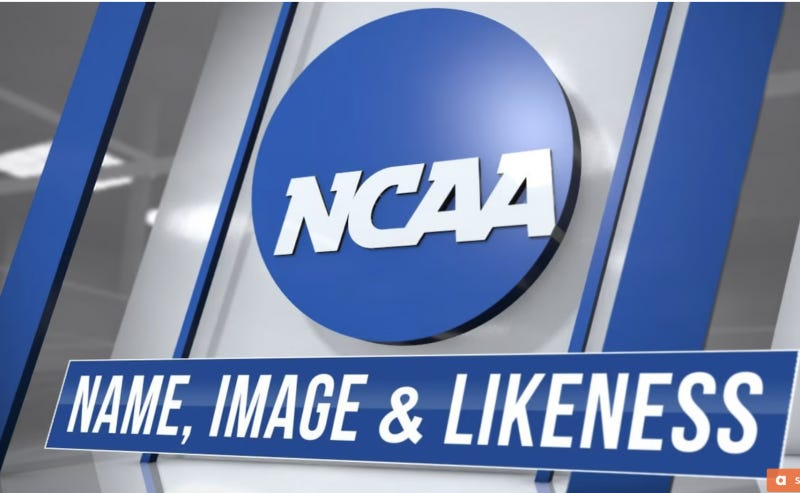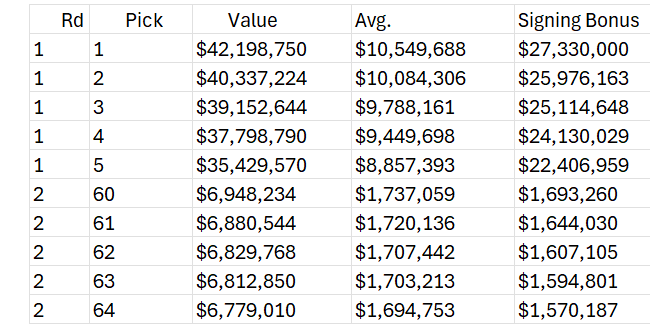Storm on horizon for NIL, portal
College athlete free agency could create unhinged chaos
After decades of antitrust violations and misusing athletes to benefit colleges and the almighty NCAA, the end is near.
What’s next? It's hard to tell, but it will differ from anything we know. College sports will continue its crescendo of chaos unless significant changes are made. In the last few months, we witnessed a tsunami of NIL (Name, Image, Likeness) deals inundate the college sports landscape.
By deals, we mean purchases.
Quarterback Carson Beck, who began the 2024 season as the No. 1 candidate for the Heisman and rated No. 1 for the 2025 draft, was derailed by an injury and transferred from Georgia to Miami to rehab his draft status. Hall of Football sources confirmed that he received more than $4 million in NIL for his final year of eligibility. Quarterback Darian Mensah transferred from Tulane to Duke for $8 million over two years, and John Mateer moved from Washington State to Oklahoma at the same price.
There are other twists, such as former Texas quarterback Quinn Ewers being offered $8 million last Thursday by one or two teams AFTER he announced on Wednesday that he was entering the NFL Draft.
Some believe Ewers’ draft stock slid in 2024. Once, his talents were rated as top-10 consideration, but injuries and a few negative knocks pushed him into the third round by some, although we still liked him no later than the middle of the first round.
For Quinn and early-season darling Beck, these rating forecasts are at the heart of a business decision that features NIL and the NFL in direct competition. According to calculations by Spotrac.com, the difference between being a top-three draftee and one drafted at the bottom of the second round is more than $35 million over a four-year deal. So Beck went back to school for $4 million and one season to increase his value in the draft. Ewers eschewed $8 million for one season. Let’s see how that plays out.
Here is a chart cut from Spotrac to show how rookie four-year contracts diminish from the top down.
For those who thought the recent transfer portal and soaring NIL compensation were chaotic, that disorder may be mild compared to the storm on the horizon. Even as you read this, athletes and their legal representatives are lining up to extract their pound of flesh from the very college meat market that used and abused them for decades.
The once-dominant NCAA is waving the white flag. It sees a long line of unwinnable lawsuits against its con game, which featured independent businesses united under the umbrella of that very NCAA, to wring the worth of players for the benefit of everybody but the players themselves.
NIL and its companion facilitator, the transfer portal, combined to create an ever-accelerating drag race to the cliff.
As college sports teetered on the edge of that precipice, one legal case imposed a reality check on the whole thing. The result is the apparent collapse of the whole transfer portal, which seems to have been rendered irrelevant and unnecessary.
In a potential precedent-setting move, former Wisconsin defensive back Xavier Lucas, who UW refused to enter into the portal after he requested a transfer, is leaving the school for Miami.
This should set a precedent, both in the ability for schools to enforce revenue-sharing agreements that are contingent on the House settlement’s passage and, perhaps more important, for players to transfer at any time, even outside the portal windows or without entering the portal at all.
Lucas, a freshman this past season, withdrew from classes at Wisconsin and enrolled academically at Miami. He presumably skirts any NCAA transfer rules by not formally signing with Miami. He enrolled for the fall 2025 semester, but is expected to be reclassified to spring 2025,
The move, for now, avoids a legal filing. Lucas’ lawyer, Darren Heitner, planned to file suit against the NCAA and Wisconsin over antitrust claims related to the situation, accusing Wisconsin of blatantly violating NCAA rules by not inserting Lucas’ name into the portal as he requested and questioning the legality of the NCAA’s transfer portal.
Wisconsin officials have remained quiet on the situation. However, the school declined to enter Lucas into the portal because he signed a two-year revenue-share agreement last month before requesting a transfer.
The NCAA, which learned lessons from multiple failed antitrust cases, has thrown the door open for transfers beyond the parameters of the portal.
“NCAA rules do not prevent a student-athlete from unenrolling from an institution, enrolling at a new institution, and competing immediately,” the NCAA said in a statement to Ross Dellenger of Yahoo.com.
Translation: The transfer portal doesn’t mean anything, and players have the same freedom as students to switch schools whenever they want.
There’s no solution to the free market experience now afforded to those who previously played for free. At this point, we see only two ways to restore order.
Lobby Congress to create a national framework for paying college athletes and binding them to schools for specific contract terms.
Welcome a union that would operate as a multi-employer bargaining unit, with a full-blown collective bargaining agreement that creates the same kind of rules that apply to professional athletes. This could create a situation where the College Players Union and the NFL Players Association might get creative in working together.
But we do think No. 2 is an inevitability because they are, after all, professional athletes. The sooner the NCAA and its members fully and completely turn the page for good on the corrupt system they’ve always maintained, the better off everyone will be.
One thing is sure. College sports will never really be the same.
Can we have a “rah”?






